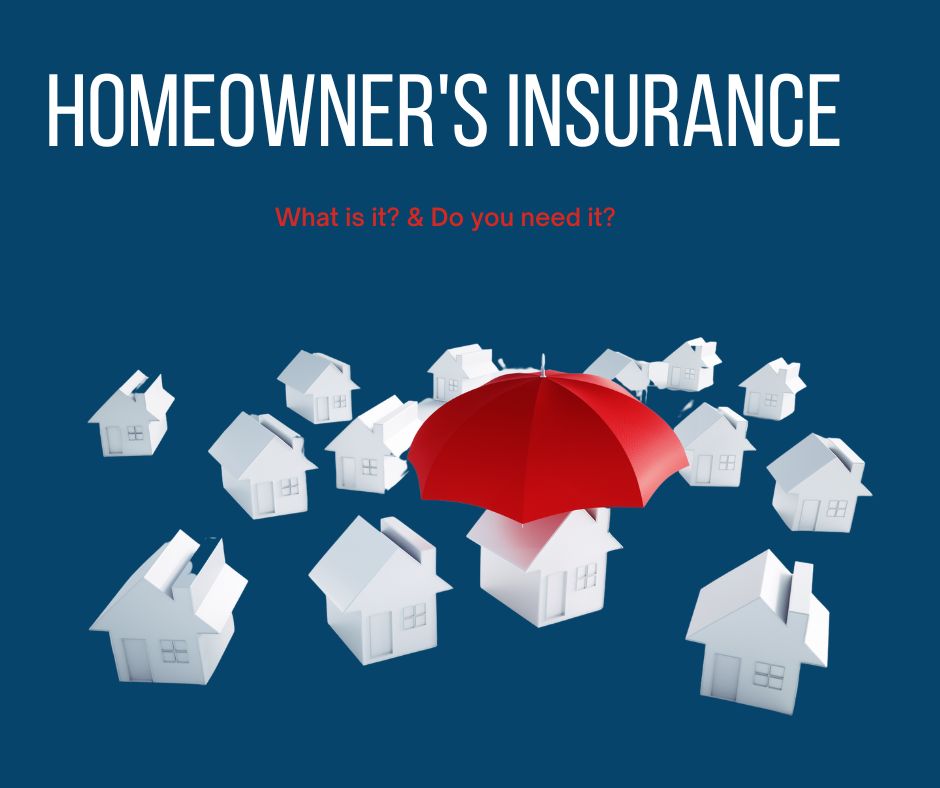
Homeowner’s Insurance
Purchasing a home is a significant investment, and protecting that investment is crucial. Homeowners insurance is a type of insurance policy that protects your home and personal belongings in the event of damage or loss. In this blog, we will explain what homeowners insurance is and why someone should have it.
What is Homeowners Insurance?
Homeowners insurance is a type of insurance policy that provides coverage for your home and personal belongings in the event of damage or loss. This includes damage caused by natural disasters, theft, and other unexpected events. Homeowners insurance also provides liability coverage in the event someone is injured on your property and decides to sue you.
Homeowners insurance policies typically have different levels of coverage, including dwelling coverage (for the structure of your home), personal property coverage (for your belongings), liability coverage (in case someone is injured on your property), and additional living expenses coverage (in case you are unable to live in your home due to damage).
Why Should Someone Have Homeowners Insurance?
There are several reasons why someone should have homeowners insurance. First, homeowners insurance can help protect your investment in your home. If your home is damaged or destroyed, homeowners insurance can help cover the cost of repairs or rebuilding. This can provide peace of mind and help ensure that you don’t face financial hardship in the event of a disaster.
Second, homeowners insurance can protect your personal belongings. If your home is damaged or destroyed, your personal belongings may be lost or damaged as well. Homeowners insurance can help cover the cost of replacing your personal belongings, including furniture, electronics, and other valuables.
Third, homeowners insurance provides liability coverage. If someone is injured on your property and decides to sue you, homeowners insurance can help cover the cost of legal fees and any damages awarded in the lawsuit. This can help protect you from financial ruin in the event of a lawsuit.
And finally, if you have a mortgage, your lender will generally require homeowner’s insurance to protect their stake in the property.
While homeowners insurance provides valuable coverage, it’s important to understand what is and isn’t covered under your policy. Here are some of the things that are and are not typically covered by homeowners insurance:
Covered by Homeowners Insurance:
- Damage to the structure of your home caused by events like fire, wind, hail, lightning, and other natural disasters.
- Damage to personal belongings, such as furniture, electronics, and clothing, caused by events like theft, vandalism, and natural disasters.
- Liability coverage in case someone is injured on your property and decides to sue you.
- Additional living expenses if you are unable to live in your home due to damage or loss.
Not Covered by Homeowners Insurance:
- Flood damage: This is typically covered by a separate flood insurance policy.
- Earthquake damage: This is typically covered by a separate earthquake insurance policy.
- Normal wear and tear: Homeowners insurance is designed to cover sudden and unexpected damage, not wear and tear over time.
- Intentional damage: If you intentionally damage your home or belongings, this is not covered by homeowners insurance.
- High-value items: Certain high-value items, such as jewelry and artwork, may require additional coverage beyond what is provided by your homeowners insurance policy.
Additional Insurance Types
- Flood Insurance: As mentioned earlier, flood damage is not typically covered under a standard homeowners insurance policy. If you live in an area that is prone to flooding, you may want to consider purchasing a separate flood insurance policy.
- Earthquake Insurance: Similar to flood insurance, earthquake damage is not typically covered under a standard homeowners insurance policy. If you live in an area that is prone to earthquakes, you may want to consider purchasing a separate earthquake insurance policy.
- Umbrella Insurance: Umbrella insurance provides additional liability coverage beyond what is provided by your homeowners insurance policy. This can be particularly useful if you have significant assets that could be at risk in the event of a lawsuit.
- Home Warranty: A home warranty is a service contract that covers the cost of repairs or replacements for certain home appliances and systems, such as HVAC systems, plumbing, and electrical systems. While a home warranty is not technically insurance, it can provide valuable peace of mind and protection for homeowners.
- Title Insurance: Title insurance provides protection against financial loss in the event that there are issues with the ownership of your home or property. This can include issues such as liens, claims by previous owners, and other title defects.
It’s important to carefully consider your individual needs and circumstances when deciding which additional types of insurance to purchase. Work with a trusted insurance provider to evaluate your options and determine the best course of action for your specific situation.
Customizing Your Insurance Policy
Insurance policies are adjustable to the needs of each individual. There are several adjustments that homeowners can make to decrease their insurance costs or increase their coverage. Here are a few examples:
- Increase Your Deductible: One of the easiest ways to lower your insurance premium is to increase your deductible. By opting for a higher deductible, you are taking on more risk in the event of a claim, but you’ll also pay less in premiums.
- Bundle Your Insurance Policies: Many insurance companies offer discounts to customers who bundle their homeowners insurance with other types of insurance, such as auto or life insurance.
- Improve Your Home Security: Taking steps to improve the security of your home, such as installing a security system or deadbolt locks, can often result in lower insurance premiums.
- Maintain Your Home: Keeping your home in good condition, including regular maintenance and repairs, can help lower your insurance costs. This is because a well-maintained home is less likely to experience damage or loss.
- Increase Your Liability Coverage: While increasing your liability coverage may result in a slightly higher premium, it can also provide valuable protection in the event that someone is injured on your property and decides to sue you.
- Review Your Coverage Annually: It’s a good idea to review your insurance coverage annually to ensure that you have adequate coverage for your changing needs. For example, if you have made significant improvements to your home or have acquired valuable assets, you may need to adjust your coverage accordingly. This is a big one that many homeowners forget about. You could significantly improve your costs by having an annual check-in with your insurance broker.
By taking these steps and working with your insurance provider, you can ensure that you have the coverage you need at a price that fits your budget.
Already have homeowner’s insurance? We highly recommend reviewing your policy with your agent annually to ensure you have the proper amount of coverage and are getting the best possible rate.
In conclusion, homeowners insurance is a crucial investment for anyone who owns a home. It provides coverage for your home and personal belongings, liability protection, and peace of mind in the event of a disaster. If you are a homeowner, it’s important to work with a trusted insurance provider to ensure that you have the right level of coverage for your needs.
